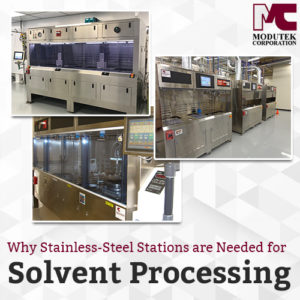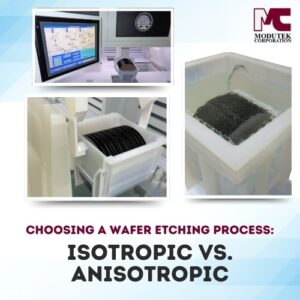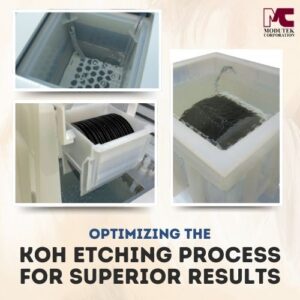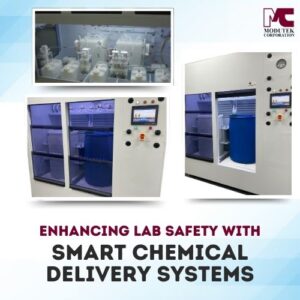 During silicon wafer fabrication, BEOL (Back End of Line) processes may require solvent-based stations to ensure compatibility with semiconductor manufacturing steps. FEOL (Front End of Line) acid-based chemistry may not be suitable for BEOL finishing. Instead, stainless-steel stations with solvents such as acetone, IPA (Isopropyl Alcohol) or EDP (Ethylenediamine Pyrocatechol) complete wafer etching, stripping, and cleaning. Stainless steel is used for these stations because it is impervious to solvents and because it reduces the risk of fire when solvents are highly inflammable.
During silicon wafer fabrication, BEOL (Back End of Line) processes may require solvent-based stations to ensure compatibility with semiconductor manufacturing steps. FEOL (Front End of Line) acid-based chemistry may not be suitable for BEOL finishing. Instead, stainless-steel stations with solvents such as acetone, IPA (Isopropyl Alcohol) or EDP (Ethylenediamine Pyrocatechol) complete wafer etching, stripping, and cleaning. Stainless steel is used for these stations because it is impervious to solvents and because it reduces the risk of fire when solvents are highly inflammable.
Why BEOL Wafer Fabrication Steps May Require Solvent-Based Stations
A wet bench FEOL fabrication starts by repeatedly cleaning, etching, and stripping wafers to build microscopic structures in the silicon. The common acid-based processes used include RCA clean, with chemicals such as hydrogen peroxide and hydrochloric acid; KOH etch, with potassium hydroxide; and Piranha clean, with sulfuric acid. As well as etching the silicon wafers, these chemicals remove both organic and metallic impurities from the surfaces of the wafers, leaving them completely clean and pure for the next process steps. The structures etched during these FEOL steps form the physical parts of the semiconductor components such as transistors.
In the BEOL process steps, the transistors and other components are interconnected and connected to plugs or sockets that interface with outside signals. The connecting paths are metallic, usually made of copper or aluminum, so that they can conduct electrical charges efficiently. Once the metallic paths are deposited on the silicon wafers, acid-based processes can no longer be used because the acidic chemicals damage the metallic paths. Instead, a solvent manufacturing process is used with solvents that are compatible with metals but can complete the silicon wafer processing and produce the final semiconductor components.
Solvent-Based Wet Benches Need Special Safeguards and Protection
The solvents used in wet bench stations are highly inflammable and operators have to be protected against being exposed to fumes or contact. Stainless steel stations using inflammable solvents have to be explosion-proof and satisfy the Class 1, Division 2, Group D explosion-proof standards. They should be designed with fire suppression and wired to the NFPA 70 and 79 standards. An emergency power off mushroom button with safety interlocks helps protect operators if something goes wrong and PVC safety shields help prevent accidental contact with the chemicals. An experienced wet bench manufacturer can ensure that these safety regulations are followed and that operating the solvent stations is as safe as possible.
Modutek’s Stainless Steel Solvent Stations Operate Safely and Meet Customer Requirements
With over 30 years of experience in wet process technology, Modutek designs and builds stainless steel solvent stations to operate safely and meet customer requirements. These stations are made of 304 stainless steel and are wired to the NFPA 70& 79 standards. Fire suppression is included and extensive customization is available.
Stations can be fully automated, semi-automatic, or manual. Fully automated stations reduce operator error and feature excellent repeatability, both for batch processing and for keeping variables constant over an extended period of continuous operation. Semi-automatic stations provide many of the benefits of fully automated operation but at a lower cost. Manual operation is ideal for testing or for prototypes. Once the process has been optimized with manual adjustments, automatic operation can reduce defects and improve facility performance. SolidWorks Simulation software is available to analyze the process and calculate chemical flows. The software can improve etching performance, improve yields and increase throughput.
On the performance side, Modutek stainless steel stations can operate with temperatures from thirty to one hundred degrees centigrade, heat up the bath at a rate of 2 degrees centigrade per minute, and maintain the temperature with an accuracy of plus/minus 1 degree centigrade. Heating elements are four-sided and a process temperature controller is available as an option.
Modutek’s Expertise in Wet Process Equipment
Modutek designs and builds their own wet process equipment in-house using their own expertise and experience. Their wet bench equipment is designed to meet high quality standards, and are customized to meet specific customer requirements. Solvent-based stainless-steel stations deliver top performance for BEOL processing and Modutek can ensure the equipment meets specific customer needs. Contact Modutek for a free consultation to discuss your specific process requirements.




